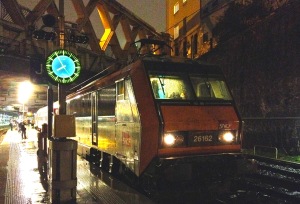Passengers hurrying for an evening train on Friday December 12 at Paris Gare de l’Est were greeted with a small demonstration and speeches.
In the rain at the other end of the station’s Platform 5, a couple of photographers were turning their lenses towards SNCF electric locomotive 26162.
For this train was the final Paris-Munich sleeper service, axed from that night by operator Deutsche Bahn.
In pouring Parisian rain, SNCF 26162 prepares to leave with the 2005 sleeper service on December 12 2014. This was the service’s final departure. PHILIP HAIGH.
The train’s arrival in Bavaria’s capital the following morning went unremarked as bleary eyed passengers trudged towards the concourse in search of onward connections.
Aboard the train itself, there had been no wake – there was no bar or restaurant car – although I suspect a few couchette compartments were well stocked with beer and wine.
Sleeper services are shrinking all over Europe. Only in Britain do they appear to be thriving. And that’s in stark contrast to the situation a decade ago when Europe’s services were thriving and Britain’s in decline.
Since then, there’s been a successful campaign to save the Cornish Sleeper. Indeed, it can now be hard to book a berth on this train. Scotland’s sleeper trains are set to be improved with new stock and considerable investment.
For long-distance travellers, sleeper services make good use of time. Board in one city and wake up the next morning in another. The decline of the European network pushes people towards short-haul flights from Paris to Berlin, for example, if their time is valuable.
Despite DB withdrawing such City Night Line trains, the company’s website was still promoting the sleeper concept a couple of weeks later: “With City Night Line, you get a good night’s sleep and wake up fresh at your destination the next morning. When you travel by City Night Line, you can be sure of a comfortable and pleasant journey whether you are planning a short break, visiting friends or family, or taking a business trip.”
Why then have the trains been axed? Those following their fate closely suggests that it’s a combination of European Union pressure to put railways on a commercial and competitive footing. Writing in November, EU blogger Jon Worth said: “The story about why this is happening is a complicated one, but at its core is the change in the nature of Europe’s railways – from being public services with a public ethos, to competitive, profit making businesses. The EU itself is behind this change, forcing railways to separate their networks from their operations to try to promote competition. This change has worked to a certain extent for rail freight, but when it comes to passengers it means long distance services that run only a couple of times a day, and are borderline profitable, become too complicated and cumbersome to operate and are cut from the timetables. Track access charges – the cost to a rail company to run a service on a neighbouring country’s tracks – are often cited as the reason.”
It seems no-one is really interested in making international sleeper trains work and there’s no organisation that can effectively lobby for them.
Keith Barrow in an IRJ blog commented: “In this shifting landscape, overnight services seem to have been largely forgotten. It seems ironic that while the European Commission ploughs billions of euros into developing cross-border rail infrastructure, international links are being quietly curtailed because there is no common vision for their continued operation. This flies in the face of EU policy on modal shift and carbon reduction, effectively forcing rail passengers onto short-haul flights.”
The European Passengers’ Federation (no, I’d not heard of it either) briefly mentioned CNL services in its December bulletin saying: “An independent fact-finding study should be commissioned on the economics of international night trains and their social and economic benefits, as the first step towards improving them.”
Too little and too late. Now the trains have gone, I can’t see them returning. Europe is the poorer for its lost international night trains.
This article first appeared in RAIL 765.
